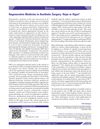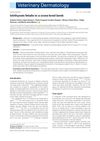 19 citations,
December 2015 in “Journal of Investigative Dermatology”
19 citations,
December 2015 in “Journal of Investigative Dermatology” The protein p53 directly reduces the production of Keratin 17, a skin and hair protein, in rats with radiation dermatitis.
 1 citations,
January 2014 in “Journal of Cutaneous and Aesthetic Surgery”
1 citations,
January 2014 in “Journal of Cutaneous and Aesthetic Surgery” Regenerative medicine shows promise for aesthetic surgery, but needs more research for widespread use.
 47 citations,
March 2017 in “Clinical, cosmetic and investigational dermatology”
47 citations,
March 2017 in “Clinical, cosmetic and investigational dermatology” Certain skin conditions may indicate or increase the risk of Parkinson's disease.
51 citations,
August 2013 in “The Journal of experimental medicine/The journal of experimental medicine” Loss of a specific protein in skin cells causes symptoms similar to psoriasis.
15 citations,
July 2014 in “The journal of investigative dermatology/Journal of investigative dermatology” iPSCs can help treat genetic skin disorders by creating healthy skin cells from a small biopsy.
 3 citations,
November 2023 in “Frontiers in cell and developmental biology”
3 citations,
November 2023 in “Frontiers in cell and developmental biology” Melanocytes are important for skin and hair color and protect the skin from UV damage.
 September 2023 in “Çukurova medical journal (Online)/Çukurova medical journal”
September 2023 in “Çukurova medical journal (Online)/Çukurova medical journal” EZH2 levels decrease as fetuses develop and are higher in adult skin, which may affect skin growth and repair.
 January 2017 in “Springer eBooks”
January 2017 in “Springer eBooks” The document explains various skin conditions and their treatments.
 8 citations,
September 2016 in “Reviews in Endocrine and Metabolic Disorders”
8 citations,
September 2016 in “Reviews in Endocrine and Metabolic Disorders” Skin health and diseases are closely linked to metabolic processes.
 43 citations,
August 2018 in “Cell Stem Cell”
43 citations,
August 2018 in “Cell Stem Cell” Hoxc genes control hair growth through Wnt signaling.

Injecting a person's own skin cells back into their skin is a promising, safe, and affordable treatment for skin disorders.
 2 citations,
March 2020 in “International Journal of Molecular Sciences”
2 citations,
March 2020 in “International Journal of Molecular Sciences” Topical treatments can deliver active molecules to skin stem cells, potentially helping treat skin and hair disorders, including skin cancers and hair loss.
 January 2024 in “Burns and trauma”
January 2024 in “Burns and trauma” The skin microbiome helps heal wounds and can be targeted to improve healing.
 147 citations,
January 2003 in “American journal of clinical dermatology”
147 citations,
January 2003 in “American journal of clinical dermatology” The document concludes that accurate diagnosis of ichthyosis is crucial for treatment and genetic advice, and ongoing research is needed for better therapies.
8 citations,
February 2022 in “Frontiers in Medicine” COVID-19 may trigger severe skin flare-ups in people with autoimmune conditions like lupus.
 74 citations,
March 2001 in “Seminars in Cutaneous Medicine and Surgery”
74 citations,
March 2001 in “Seminars in Cutaneous Medicine and Surgery” The document concludes that skin biopsies, genetic and environmental factors, and specific treatments are important in managing cutaneous lupus erythematosus.
 January 2024 in “Archives of pharmacy practice”
January 2024 in “Archives of pharmacy practice” The skin is vital for protection, temperature control, fluid balance, immunity, and sensing, with damage affecting daily life and mental health.
 133 citations,
September 2013 in “Nature Reviews Molecular Cell Biology”
133 citations,
September 2013 in “Nature Reviews Molecular Cell Biology” Different types of stem cells and their environments are key to skin repair and maintenance.
 1 citations,
June 2017 in “Veterinary dermatology”
1 citations,
June 2017 in “Veterinary dermatology” A cross-bred lamb with severe skin and movement issues had ichthyosis fetalis but normal vitamin A levels.
 1 citations,
January 2013 in “Elsevier eBooks”
1 citations,
January 2013 in “Elsevier eBooks” The document reviews various hair and nail disorders, their causes, and treatments, emphasizing the need for proper diagnosis and the link between nail changes and systemic diseases.
 508 citations,
February 2007 in “Cell”
508 citations,
February 2007 in “Cell” Epithelial stem cells are crucial for tissue renewal and repair, and understanding them could improve treatments for damage and cancer.

Thermal spring waters and their microbes could be good for skin health and treating some skin conditions in skincare products.
24 citations,
December 2018 in “Inflammation and Regeneration” Phospholipase A2 enzymes play key roles in skin health and disease.
 January 2000 in “BioScience”
January 2000 in “BioScience” The document concludes that understanding hair biology is key to treating hair disorders, with gene therapy showing potential as a future treatment.
 17 citations,
August 2019 in “Frontiers in Immunology”
17 citations,
August 2019 in “Frontiers in Immunology” Non-invasive methods show promise for diagnosing skin diseases like psoriasis and lupus but need more research for regular use.
 2 citations,
January 2004 in “Elsevier eBooks”
2 citations,
January 2004 in “Elsevier eBooks” Lupus affects the skin in various ways, and proper skin examination is crucial for diagnosis and treatment.
 2 citations,
July 2013 in “Veterinary dermatology”
2 citations,
July 2013 in “Veterinary dermatology” Dog skin with hair loss, when transplanted to mice, regrew hair, suggesting the hair loss cause is likely body-wide, not skin-specific.
 237 citations,
June 2013 in “Nature Medicine”
237 citations,
June 2013 in “Nature Medicine” A protein from certain immune cells is key for new hair growth after skin injury in mice.
 83 citations,
May 2013 in “International Journal of Molecular Sciences”
83 citations,
May 2013 in “International Journal of Molecular Sciences” Skin development in mammals is controlled by key proteins and signals from underlying cells, involving stem cells for maintenance and repair.
 1 citations,
September 2022 in “The journal of investigative dermatology/Journal of investigative dermatology”
1 citations,
September 2022 in “The journal of investigative dermatology/Journal of investigative dermatology” MicroRNA-148a is crucial for maintaining healthy skin and hair growth by affecting stem cell functions.


























